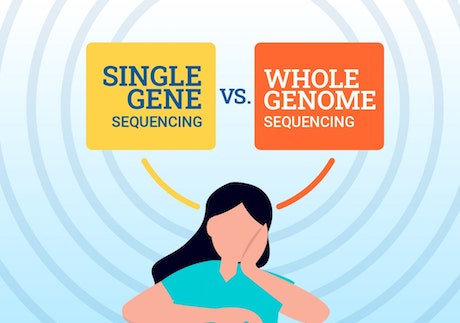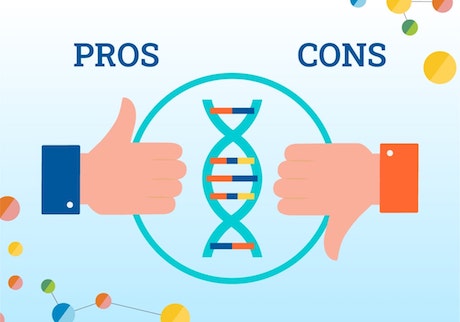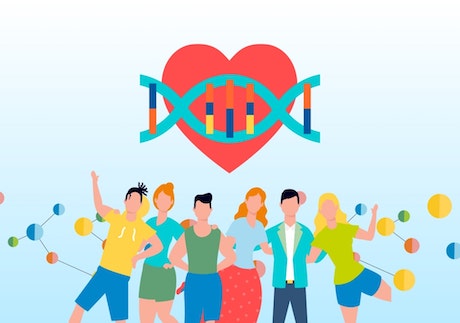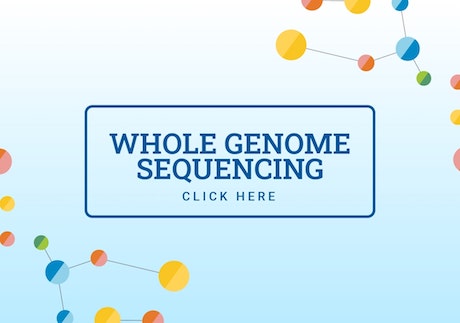By Dr. Brandon Colby MD, a physician-expert in the fields of Genomics and Personalized Preventive Medicine.
You may have heard about how powerful whole genome sequencing can be. After all, this test can tell you everything you need to know about your DNA. But what can you personally gain from learning this information?
Read on to find out exactly why whole genome sequencing is so important for your health.
The Benefits of Whole Genome Sequencing
Have you ever wondered what your exact ethnicity is? Or whether you’re at risk of developing certain diseases later on in life? Perhaps you’re interested in determining whether you carry genetic data that could affect your future children’s health?
Up until a few years ago, the mere thought of being able to have access to this information seemed like science fiction. But thanks to the advent of fast and effective DNA sequencing technologies, anyone can have their DNA sequenced in a matter of weeks.
Through genetic testing, you’ll be able to learn a great deal of information about yourself, and even your past and future family members.
Why Is the Genome Important
The human genome sequence contains approximately 3 million base pairs conformed by nucleotides that are bound together, forming the building blocks of your DNA. The order of these base pairs determines specific coding regions in your DNA which contain information that directs cells to produce many different types of proteins.
Proteins carry out thousands of different processes in the human body, and certain genetic variants can lead to defects in specific proteins, causing genetic conditions. These coding portions of your DNA are called exons, and the entirety of your exons make up your exome.
But even the portions of your DNA that are “non-coding” help regulate DNA transcription processes. Therefore, it shouldn’t come as a surprise to learn that sequencing your entire genome can provide troves of information.
What Whole Genome Sequencing Tells You
WGS and other types of DNA sequencing can be used for different purposes, from discovering your exact ancestry to assessing diverse health risks. Thanks to its multiple applications, WGS also has the potential to become an important aid in the design and implementation of public health initiatives. Continue reading for what can whole genome sequencing detect.
Use Your Genome For Health
The clinical utility of WGS lies in its ability to provide information regarding your present and future health. In fact, DNA sequencing is widely considered to be the future of personalized medicine. As more and more people get their DNA sequenced, healthcare professionals will be able to use their genomic data to provide care tailored to a person’s needs, health risks, and lifestyle.
WGS can be used to measure your predisposition to develop certain preventable diseases — such as high blood pressure and diabetes —, which will allow you to take preventative measures. It can also identify genetic variants that can directly affect your health and cause rare diseases, even if you’re asymptomatic at the time of the test.
Your DNA sequence can also be analyzed to assess whether you carry genetic mutations that may cause rare diseases in your offspring. Considering that rare diseases affect more than 350 million people around the world, it’s easy to see why their early detection is so important for prenatal care and newborn health. Additionally, using WGS for genetic testing during pregnancy is less invasive than other types of traditional prenatal tests.
WGS can be used for prenatal or preconception genetic testing — especially when one or both parents have a family history of genetic disorders. Genomic sequencing can be a helpful tool for those who are trying to conceive and hope for a healthy baby. DNA testing can identify many Mendelian diseases, which are genetic diseases caused by alterations or abnormal rearrangements in a specific gene or chromosome.
Genomic medicine can even be used to determine medication side effects. Pharmacogenomics is a field of genetic testing that studies the different ways in which your genotype can affect your response to medications. Pharmacogenomics can be used to adjust medication dosing or choose between different therapeutic options.
Use Your Genome For Ancestry
There are many reasons why someone would want to discover their exact genetic ancestry. For some, it’s a way to learn more about family members they may not have been able to meet personally. For others, it can shine a light on possible health risks that are linked to ethnicity and race.
WGS will compare your genetic markers to the sequencing data found in specific ethnic populations to determine exactly where your ancestry comes from. Different types of genetic testing can be used to make sure that your genetic genealogy is as thorough as possible.
Explore Your Genome Data For Self Discovery
The combination of the different types of data provided by your genome sequence will tell you more about yourself than you ever knew before. Your genome determines your phenotype — the composite of all characteristics that can be observed in an individual. In addition to being used for medical or ancestry purposes, WGS reveals extensive information regarding many other areas of your life and body, from your diet to your daily habits.
Whole genome sequencing can even be used to assess your lifestyle and wellness through the use of nutrition genomics (also known as nutrigenomics), which study the correlation between food and the genome, and even fitness genetics.
How To Use The Genome Explorer App To Search Your DNA
The Genome Explorer app is a resource that essentially works as a search engine for your DNA sequence. It can be used with genomic data from tests provided by different companies, allowing you to understand any variants present in your DNA and their significance.
You can use Genome Explorer to search for conditions that are associated with variants found in your DNA, and you’ll be able to find evidence-based information regarding these conditions.

The Difference Between Single Gene Sequencing and Whole Genome Sequencing
Different methods can be used for DNA sequencing, and each of them serves a different purpose. Since WGS analyzes both your coding and non-coding DNA, it includes far more information than single gene sequencing, single nucleotide polymorphism or SNP genotyping, and whole exome sequencing (WES). Research has shown that WGS adheres to higher quality parameters than WES.
Keep in mind that genomic medicine still uses these methods in certain situations; for example, to detect a single faulty gene in an individual who has a family history of a specific genetic disorder.
Does Whole Genome Sequencing Include the BRCA1 and BRCA2 genes?
BRCA genes are tumor suppressor genes. A small percentage of individuals carry mutated BRCA genes that lead to a higher risk of developing certain types of cancer, including female or male breast cancer, ovarian cancer, pancreatic cancer, prostate cancer, and melanoma. Fortunately, high-quality WGS can detect mutations in your BRCA1 and BRCA2.
WGS can also determine copy number variation (CNV), which is a structural DNA variation in which the number of copies of a certain section of your genome is abnormal, whether it’s through deletion or duplication. Research has found that CNV can be elevated in cancerous cells, making WGS a useful tool to detect whether someone has a higher risk for certain types of cancer.
Learn More: Genetic Testing for Breast Cancer
Does Whole Genome Sequencing Include the APOE gene?
The apolipoprotein E or APOE gene is located on chromosome 19, and it carries instructions for cells to make apolipoprotein E, which carries cholesterol and other fatty acids. There are different variants of the APOE gene, and the one you express depends on the alleles that you received from your parents.
The variant APOE ε4 has been found to increase the risk of developing Alzheimer’s disease. WGS can successfully detect APOE ε4 and other genetic variants which can increase a person’s risk of age-related cognitive decline.
Does Whole Genome Sequencing Include the COMT gene?
The COMT gene contains instructions to make catechol-O-methyltransferase, a protein that degrades catecholamines, which work as neurotransmitters in the brain. Single-nucleotide polymorphisms in the COMT gene could lead to an increased risk of behavioral problems, cognitive disorders, and mental illness — although research on the topic is still ongoing. WGS can detect these allelic variants in the COMT gene.
Pros and Cons of Genome Sequencing

Just as with any other type of medical procedure, genome sequencing has pros and cons. It’s important to find a DNA sequencing provider that delivers high-quality testing and results.
Pros of Genome Sequencing
- Genome sequencing is a safe procedure; in many cases, samples are collected at home.
- WGS provides individuals with the health information that they need to make lifestyle modifications.
- Genetic counseling can be helpful for family planning and prospective parents, especially those with a family history of genetic diseases who dream of having a healthy child.
- Genome sequence data can be used to better understand specific communities and promote public health initiatives tailored to their needs.
- Medical genetics and pharmacogenomics can lead to more accurate diagnoses and effective treatments while reducing the burden placed on healthcare systems.
- Genetic genealogy data helps individuals discover their exact genetic ancestry for personal or medical purposes.
Cons of Genome Sequencing
- It is necessary for genome analysis results to be analyzed by a specialist to ensure a clear and accurate understanding of their meaning.
- Sequencing.com data can reveal genetic variations of uncertain significance that may not cause any health issues. If the results aren’t reviewed by a specialist, the presence of these variants could cause undue stress and anxiety.
Whole Genome Sequencing Analysis Services
The first method used for DNA sequencing was called Sanger sequencing, and it was used to complete the Human Genome Project. But while this sequencing technology was groundbreaking for its time and was used to complete large-scale human genetics projects, it was very expensive and time-consuming. In fact, genotyping a single individual’s entire DNA could take many years.
Next-generation sequencing (NGS) or high-throughput sequencing technologies have significantly reduced sequencing costs and timeframes. In fact, the data analysis required to sequence an individual’s entire DNA can now be carried out in a matter of weeks.
Modern sequencing platforms are even able to sequence smaller DNA fragments in a matter of hours or days, which can be especially helpful in cases where genome analysis is used to quickly determine a patient’s diagnosis and treatment. It’s very likely that precision medicine will lead to better health outcomes in the near future.
Many bioinformatics companies have developed platforms for whole genome sequencing and other types of genetic testing. These companies include Illumina, Pacific Biosciences, Sequenom, Life Sciences, Helicos Biosciences, Complete Genomics, Knome, Veritas Genetics, and, of course, Sequencing.com. If you're interested in this type of genetic testing, read about whole genome sequencing cost.
About The Author
Dr. Brandon Colby MD is a US physician specializing in the personalized prevention of disease through the use of genomic technologies. He's an expert in genetic testing, genetic analysis, and precision medicine. Dr. Colby is also the Founder of Sequencing.com and the author of Outsmart Your Genes.
Dr. Colby holds an MD from the Mount Sinai School of Medicine, an MBA from Stanford University's Graduate School of Business, and a degree in Genetics with Honors from the University of Michigan. He is an Affiliate Specialist of the American College of Medical Genetics and Genomics (ACMG), an Associate of the American College of Preventive Medicine (ACPM), and a member of the National Society of Genetic Counselors (NSGC).
References
- Khromykh A, Solomon BD. The Benefits of Whole-Genome Sequencing Now and in the Future. Mol Syndromol. 2015;6(3):108-109.
- Rui Yin, Chee Keong Kwoh, Jie Zheng, Whole Genome Sequencing Analysis. Encyclopedia of Bioinformatics and Computational Biology, Academic Press, 2019, Pages 176-183, ISBN 9780128114322.
- Haley Abel, John Pfeifer, Eric Duncavage, Chapter 10 - Translocation Detection Using Next-Generation Sequencing. Clinical Genomics, Academic Press, 2015, Pages 151-164, ISBN 9780124047488.
- Fermín J. González-Melado, Chapter 12 - Whole-Genome Sequencing as a Method of Prenatal Genetic Diagnosis. Clinical Ethics At the Crossroads of Genetic and Reproductive Technologies, Academic Press, 2018, Pages 263-291, ISBN 9780128137642.
- Gregory A. Hawkins, Chapter 5 - Analysis of Human Genetic Variations Using DNA Sequencing. Basic Science Methods for Clinical Researchers, Academic Press, 2017, Pages 77-98, ISBN 9780128030776.
- Belkadi, A. et al, Whole-genome sequencing is more powerful than whole-exome sequencing for detecting exome variants. Proceedings of the National Academy of Sciences Apr 2015, 112 (17) 5473-5478.
- Purshouse K, Schuh A, Fairfax BP, et al. Whole-genome sequencing identifies homozygous BRCA2 deletion guiding treatment in dedifferentiated prostate cancer. Cold Spring Harb Mol Case Stud. 2017;3(3):a001362.
- Galina A. Erikson, Dale L. Bodian, Manuel Rueda, Bhuvan Molparia, Erick R. Scott, Ashley A. Scott-Van Zeeland, Sarah E. Topol, Nathan E. Wineinger, John E. Niederhuber, Eric J. Topol, Ali Torkamani. Whole-Genome Sequencing of a Healthy Aging Cohort, Cell, Volume 165, Issue 4, 2016, Pages 1002-1011, ISSN 0092-8674.
- Jingshan Chen, et al. Functional Analysis of Genetic Variation in Catechol-O-Methyltransferase (COMT): Effects on mRNA, Protein, and Enzyme Activity in Postmortem Human Brain, The American Journal of Human Genetics, Volume 75, Issue 5, 2004, Pages 807-821, ISSN 0002-9297.
- Tunbridge EM, Harrison PJ, Weinberger DR (July 2006), Catechol-O-methyltransferase, cognition, and psychosis: Val Met and beyond. Biological Psychiatry. 60 (2): 141–5.

